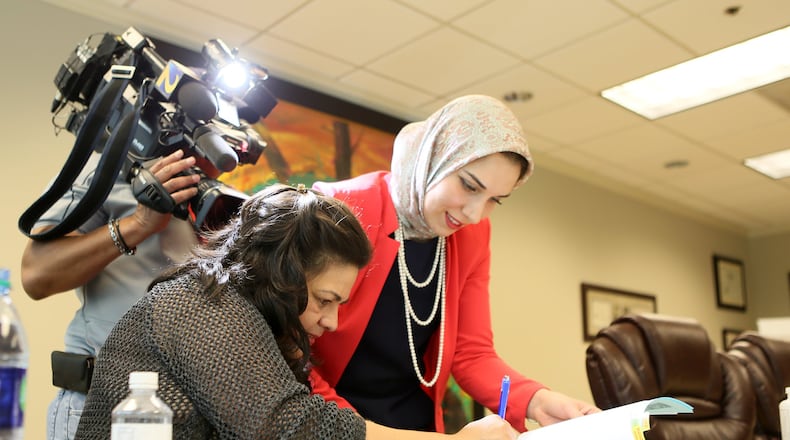A Gwinnett County woman who spent a month in a south Georgia immigration detention center despite insisting she is an American citizen was released on Wednesday by federal authorities.
Elizabeth Hernandez-Carrillo, the daughter of a U.S. Marine, was arrested last month at her home in Lilburn as part of a nationwide immigration enforcement operation that netted more than 680 people and drew widespread media attention. Coming soon after Donald Trump's inauguration, the raids were seen as an early move to deliver on the new president's campaign promise to crack down on illegal immigration. Federal immigration authorities said the enforcement actions were already in the works.
IN DEPTH: New detention center to cost millions
MORE: What the crackdown means
U.S. Immigration and Customs Enforcement targeted Hernandez-Carrillo, 46, because she had returned to the U.S. after being deported to Mexico in 2004 following a felony marijuana trafficking conviction.
Born in Mexico, Hernandez-Carrillo said she told ICE officials when she was being deported in 2004 — and again when she was apprehended on Feb. 8 — that she derived her citizenship from her late father, who was a naturalized U.S. citizen. An ICE spokesman said the agency is looking into her claim.
Hernandez-Carrillo’s case underscores the complexity of the nation’s immigration laws as the Trump administration seeks to ramp up enforcement and deport many more people living in the U.S. without authorization. Last month, the government issued a pair of directives that start the process of building a new wall on the southwest border, hiring 15,000 ICE and Border Patrol officials and vastly widening the pool of people prioritized for expulsion.
Hernandez-Carrillo — a mother of four U.S.-born children, including a son who is a U.S. Marine — sobbed as she described her harrowing confinement in the Irwin County Detention Center, located more than 180 miles south of Atlanta. She said she was kept alone for several days in a small cell infested with cockroaches, got dehydrated, contracted a bladder infection and desperately missed her family.
“It was terrible. It is just something you can’t even explain. I have never been away so much from them,” she said during an interview at her immigration attorney’s office just south of Roswell. “I was just crying the whole time.”
Hernandez-Carrillo said her common law husband was arrested with her last month and deported to Mexico last week. An ICE spokesman said the government has not determined Hernandez-Carrillo is a U.S. citizen, so she has been released on an order of supervision, meaning she must periodically check in with the agency. The spokesman added ICE detention centers follow industry standards and are regularly inspected by multiple entities.
“U.S. Immigration and Customs Enforcement takes very seriously any and all assertions that an individual in its custody may have a claim to U.S. citizenship,” ICE spokesman Bryan Cox said in a prepared statement. “ICE has continuously reviewed and enhanced its policies and procedures to ensure all appropriate measures are in place to avoid such incidents. Claims of U.S. citizenship of individuals encountered by ICE officers, agents, and attorneys are immediately and carefully investigated and analyzed.”
ICE has a history of mistakenly detaining and deporting U.S. citizens. In the fiscal year that ended in September, according to Cox, the agency reviewed 1,101 claims to U.S. citizenship and found 169 were “sufficient to merit release from custody during litigation.”
In 2008, Mark Lyttle, a U.S. citizen and Georgia resident with mental disabilities, wandered south of the U.S.-Mexican border for four months after he was deported. The U.S. Embassy in Guatemala helped return him home. And in 2011, the government deported a 15-year-old Texas girl to South America after she claimed to be an unauthorized immigrant. Jakadrien Turner, a runaway, repeatedly maintained she was born in Colombia and never said she was a U.S. citizen after Houston police arrested her for misdemeanor theft, according to ICE.
Final U.S. citizenship determinations, according to ICE, are made by immigration judges and another federal agency, U.S. Citizenship and Immigration Services. Citing federal privacy laws, a USCIS spokeswoman declined to comment on Hernandez-Carrillo’s case.
“Analyzing U.S. citizenship for individuals born abroad can often be very complex, as it often involves the individual reporting their birth and immigration history, residency history, immigration status, marital status of one’s parents, and the ever-changing body of law that was in place at the time of one’s birth,” Cox said. “This complexity means that some individuals don’t even know they are U.S. citizens until well after they are encountered by ICE.”
Hernandez-Carillo could not immediately provide The Atlanta Journal-Constitution with documents proving her citizenship claim. But on Wednesday, she met with her immigration attorney, Hiba Ghalib, and signed a federal Freedom of Information Act request seeking documents from USCIS they believe could prove her citizenship. They are also hiring a private investigator to help track down some documents.
“We are in a unique kind of predicament in the sense that while she and I know she is a U.S. citizen based on the facts of the case,” Ghalib said, “to prove it is going to be another issue because we are going to have to document this relationship. And that might not be that easy, given the fact that these documents are really old and perhaps inconsistent.”
As Hernandez-Carrillo talked about her case, her young grandchildren scrambled around her attorney’s conference room, happily squealing. She was eager to reunite with the rest of her children, have a nice meal and get back to her drywall installation job.
“Oh my God,” she said. “I’m so happy.”
About the Author
Keep Reading
The Latest
Featured






